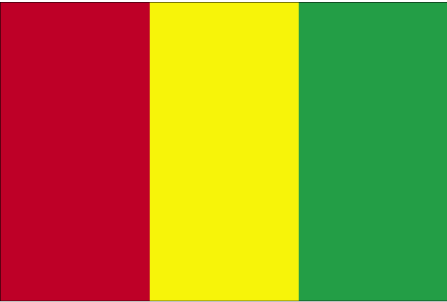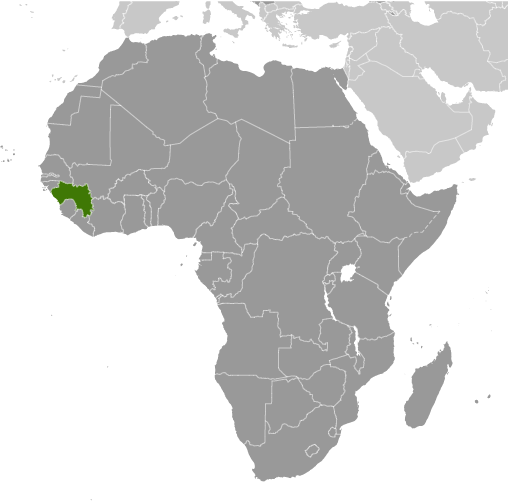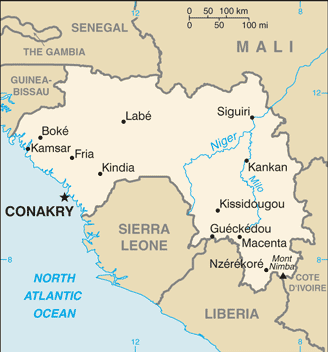Guinea has had a history of authoritarian rule since gaining its independence from France in 1958. Lansana CONTE came to power in 1984 when the military seized the government after the death of the first president, Sekou TOURE. Guinea did not hold democratic elections until 1993 when Gen. CONTE (head of the military government) was elected president of the civilian government. He was reelected in 1998 and again in 2003, though all the polls were marred by irregularities. History repeated itself in December 2008 when following President CONTE's death, Capt. Moussa Dadis CAMARA led a military coup, seizing power and suspending the constitution. His unwillingness to yield to domestic and international pressure to step down led to heightened political tensions that culminated in September 2009 when presidential guards opened fire on an opposition rally killing more than 150 people, and in early December 2009 when CAMARA was wounded in an assassination attempt and evacuated to Morocco and subsequently to Burkina Faso. A transitional government has been installed.
Country Name
Conventional long form:Republic of Guinea
Conventional short form:Guinea
Local long form:Republique de Guinee
Local short form:Guinee
Former:French Guinea
Government Type
republic
Capital
Name:Conakry
Geographic coordinates:9 33 N, 13 42 W
Time difference:UTC 0 (5 hours ahead of Washington, DC during Standard Time)
Administrative divisions
33 prefectures and 1 special zone (zone special)*; Beyla, Boffa, Boke, Conakry*, Coyah, Dabola, Dalaba, Dinguiraye, Dubreka, Faranah, Forecariah, Fria, Gaoual, Gueckedou, Kankan, Kerouane, Kindia, Kissidougou, Koubia, Koundara, Kouroussa, Labe, Lelouma, Lola, Macenta, Mali, Mamou, Mandiana, Nzerekore, Pita, Siguiri, Telimele, Tougue, Yomou
Independence
2 October 1958 (from France)
National Holiday
Independence Day, 2 October (1958)
Constitution
23 December 1990 (Loi Fundamentale)
Legal system
based on French civil law system, customary law, and decree; accepts compulsory ICJ jurisdiction with reservations
Suffrage
18 years of age; universal
Executive branch
Chief of state:Gen Sekouba KONATE, interim leader of the National Council for Democracy and Development, who replaced Capt. CAMARA following the attempted assassination of CAMARA on 3 December 2009
Head of government:Prime Minister of the Transitional Government Jean-Marie DORE (since 26 January 2010)
Cabinet:Council of Ministers appointed by the president
(For more information visit the World Leaders website)
Elections:president elected by popular vote for a seven-year term (no term limits); candidate must receive a majority of the votes cast to be elected president; election last held on 21 December 2003 (next scheduled for 27 June 2010); the prime minister appointed by the president
Election results:Lansana CONTE reelected president; percent of vote - Lansana CONTE 95.3%, Mamadou Bhoye BARRY 4.6%
Legislative branch
unicameral People's National Assembly or Assemblee Nationale Populaire (114 seats; members elected by a mixed system of direct popular vote and proportional party lists)
Elections:last held on 30 June 2002 (legislative elections first due in 2007 have been rescheduled multiple times and are currently unscheduled)
Election results:percent of vote by party - PUP 61.6%, UPR 26.6%, other 11.8%; seats by party - PUP 85, UPR 20, other 9
Judicial branch
Court of First Instance or Tribunal de Premiere Instance; Court of Appeal or Cour d'Appel; Supreme Court or Cour Supreme
Political Parties and Leaders
Democratic Union of Guinea or UDG [Mamadou SYLLA]; Guinean Union for Democracy or UGD; New Democratic Forces or NDF [Muoctar DIALLO]; Party for Unity and Progress or PUP [Sekou KONATE]; Rally for the Guinean People or RPG [Alpha CONDE]; Union for Progress and Renewal or UPR [Ousmane BAH]; Union for Progress of Guinea or UPG [Jean-Marie DORE, secretary-general]; Union of Democratic Forces of Guinea or UFDG [Cellou Dalein DIALLO]; Union of Republican Forces or UFR [Sidya TOURE]; United Front for Democracy and Change or FUDEC [Francois FALL]
Political pressure groups and leaders
National Confederation of Guinean Workers-Labor Union of Guinean Workers or CNTG-USTG Alliance (includes National Confederation of Guinean Workers or CNTG [Rabiatou Sarah DIALLO] and Labor Union of Guinean Workers or USTG [Dr. Ibrahima FOFANA]); Syndicate of Guinean Teachers and Researchers or SLECG [Dr. Louis M'Bemba SOUMAH]
International organization participation
ACP, AfDB, AU (suspended), ECOWAS (suspended), FAO, G-77, IBRD, ICAO, ICCt, ICRM, IDA, IDB, IFAD, IFC, IFRCS, ILO, IMF, IMO, Interpol, IOC, IOM, ISO (correspondent), ITSO, ITU, ITUC, MIGA, MINURSO, NAM, OIC, OIF, OPCW, UN, UNCTAD, UNESCO, UNHCR, UNIDO, UNMIS, UNOCI, UNWTO, UPU, WCO, WFTU, WHO, WIPO, WMO, WTO
Diplomatic representation in the US
Chief of mission: Ambassador Mory Karamoko KABA
Chancery:2112 Leroy Place NW, Washington, DC 20008
Telephone:[1] (202) 986-4300
FAX:[1] (202) 483-8688
Diplomatic representation from the US
Chief of mission:Ambassador Patricia Newton MOLLER
Embassy:Koloma, Conakry, east of Hamdallaye Circle
Mailing address: B. P. 603, Transversale No. 2, Centre Administratif de Koloma, Commune de Ratoma, Conakry
Telephone:[224] 65-10-40-00
FAX:[224] 65-10-42-97
Flag description
three equal vertical bands of red (hoist side), yellow, and green
note: uses the popular Pan-African colors of Ethiopia










